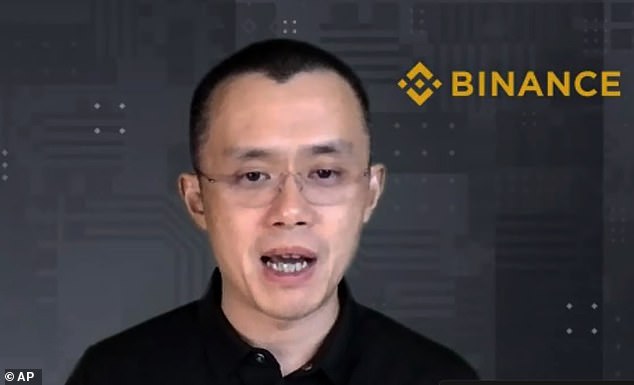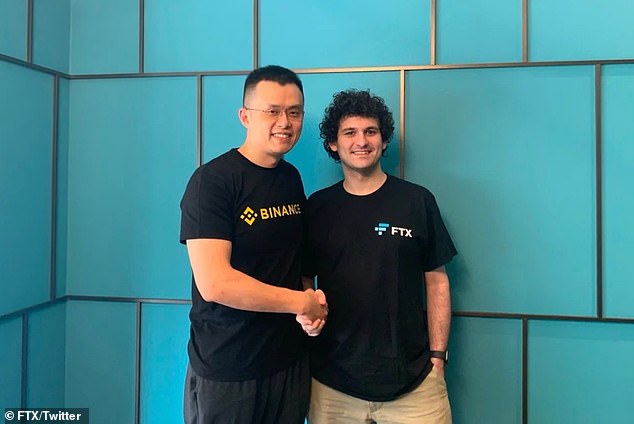Binance CEO Changpeng Zhao pleads guilty to violating US anti-money laundering rules and crypto exchange will pay $4.3 BILLION in fines to end DOJ’s criminal investigation
Binance CEO Changpeng “CZ” Zhao has pleaded guilty to money laundering charges as part of a deal with the Justice Department that will see the cryptocurrency exchange pay $4.3 billion to end the criminal investigation against the company.
The founder of the world’s largest cryptocurrency exchange also agreed to step down as CEO of Binance during a hearing in Seattle on Tuesday. However, he reportedly plans to retain the majority stake in the company founded in 2017.
Richard Teng, Binance’s former Global Head of Regional Market, was named the new CEO on Tuesday. Zhao said Teng would “ensure Binance reaches our next phase of security, transparency, compliance and growth.”
The court also recommended that Zhao pay a $50 million fine and be barred from any involvement with Binance. He is expected to be sentenced at a later date.
Binance also pleaded guilty to a criminal charge and agreed to the hefty $4.3 billion fine, including amounts to settle civil lawsuits brought by regulators against the company. The company will pay $1.81 billion within 15 months, and another $2.51 billion.
BNB’s cryptocurrency, a token created by Binance, fell about five percent after news of the settlement. Earlier on Tuesday, the token hit a five-month high following reports that the DoJ would soon announce a settlement with the company.
Binance CEO Changpeng ‘CZ’ Zhao has agreed to plead guilty to anti-money laundering charges as part of a deal with the Department of Justice
The Justice Department deal, which is detailed in the lawsuits, is part of a major settlement between the company and other U.S. agencies, including the Commodity Futures Trading Commission (CFTC) and the Treasury Department.
Zhao and others were accused of violating the Bank Secrecy Act by failing to establish an anti-money laundering program and violating U.S. economic sanctions.
Binance’s former chief compliance officer Samuel Lim will also be charged as part of the settlement, a source told Reuters, adding that Binance will also be required to fix the deficiencies.
Zhao responded to the news on Tuesday, saying it was “not easy to let go emotionally,” but he “knew it was the right thing to do.”
He continued: “I made mistakes and I have to take responsibility. This is what is best for our community, for Binance and for myself. Binance is no longer a baby. It’s time I let it walk and run. I know Binance will continue to grow and excel with the deep bench it has.”
The indictment against Zhao and Binance, unsealed on Tuesday, says the company conducted money transmission activities without a license, violating the International Emergency Economic Powers Act.
It accuses Zhao and Binance of engaging in a “deliberate and calculated attempt” to profit from the US market without adhering to its rules.
The deal ends years of investigation by US regulators into Binance. It aims to allow Binance to continue operating instead of collapsing, which would negatively impact the markets and crypto holders.
The US government tried to strike a balance between cracking down on Binance and completely disrupting the industry after several high-profile bankruptcies last year, including the bankruptcy of Binance’s former archrival FTX.

The indictment against Zhao and Binance, unsealed on Tuesday, says the company transferred funds without a license
Binance has been under the scanner of the Ministry of Justice since at least 2018.
Federal prosecutors at the agency in December 2020 asked the company to provide internal records about its anti-money laundering efforts, along with communications involving Zhao, who founded the company in 2017.
The CFTC filed civil charges against Binance in March, alleging the company failed to implement an effective anti-money laundering program to detect and prevent terrorist financing.
Internally, Binance officials and employees acknowledged that the platform facilitated “potentially illegal activities,” the CFTC alleged.
In February 2019, Binance’s former Chief Compliance Officer Lim received information about transactions by the militant Palestinian group Hamas on Binance, the CFTC wrote.
Lim, a Singaporean, “explained to a colleague that terrorists usually send “small amounts” because “large amounts constitute money laundering,” the CFTC said in its March lawsuit.
Zhao, a billionaire who was born in China and moved to Canada at age 12, said the CFTC’s “complaint appears to contain an incomplete recitation of facts, and we disagree with the characterization of many of the alleged issues.”
The SEC alleged in 13 charges that Binance artificially inflated its trading volumes, diverted customer funds, failed to keep U.S. customers off its platform and misled investors about its market surveillance controls.
The agency’s lawsuit has prompted investors to pull about $780 million from the cryptocurrency exchange, forcing the company to eliminate about a third of its U.S. workforce and reducing its trading balances to a trickle.

Zhao was an early FTX investor and withdrew just days before the collapse. He is seen with convicted fraudster, FTX founder Sam Bankman-Fried
Data firm Nansen said Binance saw a net outflow of $778.6 million in crypto tokens within 24 hours of the filing of the SEC lawsuit, and Binance recorded a net outflow of $13 million.
Binance denied the SEC’s allegations and said it would “vigorously” defend its platform.
The SEC lawsuit against Binance came about eight months after the collapse of FTX, which was also accused of commingling customers’ funds and investing the proceeds in risky investments that customers did not know they were participating in.
Days before FTX collapsed, Zhao said Binance would liquidate its FTT tokens, a cryptocurrency issued by FTX.
Binance’s announcement caused a run on the bank at FTX, but the company did not have enough money to pay investors looking to withdraw their assets as customers tried to withdraw $6 billion within 72 hours.
Bankman-Fried was ultimately convicted of large-scale fraud against FTX customers.
